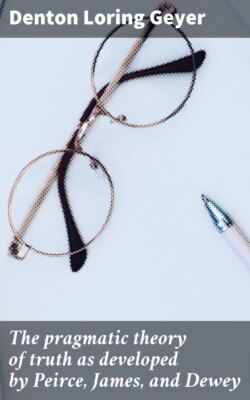Читать книгу The pragmatic theory of truth as developed by Peirce, James, and Dewey - Denton Loring Geyer - Страница 3
На сайте Литреса книга снята с продажи.
INTRODUCTORY.
ОглавлениеTable of Contents
This thesis attempts to trace the growth of the pragmatic doctrine of truth through the works of its three most famous advocates in America.
An examination of Peirce’s initial statement of pragmatism is followed by a discussion of his objections to the meaning put upon his doctrine by his would-be disciples, and his resort, in order to save himself from these ‘perversions’, to a renaming of his theory. Some evident contradictions in his different principles are pointed out.
The changing position of William James is then followed through magazine articles and books appearing successively during a period of about thirty years. One finds here a gradually but continually widening divergence from the rationalistic theories, which culminates finally in the much-quoted extreme statements of the book ‘Pragmatism’. The few subsequently published references to truth seem to consist largely of defenses or retractions of the tenets there set forth. As has been so often said, William James was too sympathetic toward the doctrines of other men to maintain a consistent doctrine of his own. His best work, like that of the higher literary type to which he approached, was to transcribe and interpret the feelings of other men. His genius lay in the clearness with which he could translate these ideas and the lucid fashion in which he could cut to the heart of ambiguities in them. With the highest and most sincere admiration for the spirit of James’ labors in philosophy and psychology, the writer is unable to find there permanent contributions to the solution of the particular problem which we have before us here, the problem of truth. In his splendid protest against all static theories, he seems to have accepted pragmatism for what it was not rather than for what it was. It was not a cut-and-dried system leaving no room for individuality, and that this was one of his strongest reasons for accepting it is shown by his asking again and again: “If this (pragmatism) is not truth, what is?” He was attempting to find a theory—almost any theory, one thinks sometimes—which would serve as an alternative to the older doctrines so incompatible with his temperament.
It is interesting to note that the frequent protests made by Peirce against the turn given his ideas by his followers are always directed against the work of James and Schiller, and never, so far as I have been able to ascertain, against that of Dewey. It therefore seems worth while to undertake a direct comparison between the views of Peirce and Dewey. This comparison, then, occupies the latter part of the thesis, with the result, it may be said at once, that Dewey’s work is found to be very closely related to the original formulation of pragmatism as made by Peirce.
The excellent historical sketches of pragmatism which have appeared during the last five years1 have been somewhat broader in scope than the present treatise, for they have usually described the development of all the pragmatic doctrines in the mass while the emphasis here is placed on the intensive treatment of a single doctrine, and this doctrine is followed, moreover, through a limited number of its expounders. Further, almost all such sketches are taken up for the most part in showing how pragmatism grew out of the older doctrines or in contrasting it with various alternative theories while the thing attempted here is, again, a careful comparison of the views of three thinkers within the School itself—with of course the writer’s own reaction to these views. It has thus seemed best to undertake no (necessarily fragmentary) treatment of truth as ‘intuition’ or ‘coherence’ or ‘correspondence’ or the rest.
General criticism of the pragmatic theory of truth, as is evident to anyone who has followed the controversy, has been principally directed against the more ‘radical’ statements of James and Schiller. Whether this is merely because these champions of the theory are more extreme, or whether they are really more prone to errors in their reasoning, we need not determine here. But it is worth pointing out that, on the other hand, if Peirce and Dewey were to be taken as the truer representatives of pragmatism a large part of the flood of recent criticism would be irrelevant. This is by no means to say that the work of Peirce and Dewey is above criticism; it is merely to call attention to the fact that most of the criticism of pragmatism is directed against principles which these two men do not happen to hold. An understanding of the doctrine in its more conservative terms, however, is certainly on the increase, and we are seldom nowadays burdened with refutations of such alleged pragmatism as that anything is true which it is pleasant to believe or that any theory of procedure is true which happens to turn out well.
